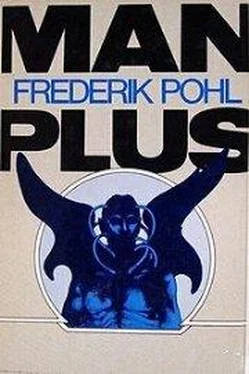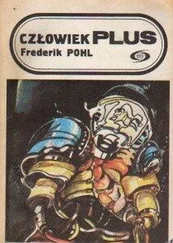In the laboratory this is an antisurvival trait. You can trick a frog with a piece of cloth, a bit of wood on a string, anything that moves properly and is the right size. He will eat them and starve. But in nature there are no such tricks. In nature only bugs move like bugs, and every bug is frog dinner.
This principle is not difficult to understand. Say this to a naive friend and he will say, “Oh, yes, I see. The frog just ignores anything that doesn’t look like a bug.” Wrong! The frog doesn’t do anything of the kind. He does not ignore non-bug objects. He simply never sees them in the first place. Tap a frog’s optic nerve and drag a marble slowly past — too big, too slow — and no instrument can pick up a nerve impulse. There is none. The eye does not bother to “see” what the frog does not want to know about. But swing a dead fly past, and your meter dials flick over, the nerve transmits a message, the frog’s tongue licks out and grabs.
And so we come to the cyborg. What Bradley had done was to provide a mediation stage between the ruby complex eyes and the aching human brain of Willy Hartnett which filtered, interpreted and generally prepackaged all of the cyborg’s visual inputs. The “eye” saw everything, even in the UV part of the spectrum, even in the infrared. The brain could not deal with so vast a flow of inputs. Bradley’s mediation stage edited out the unimportant bits.
The stage was a triumph of design, because Bradley was indeed extremely good at the one thing he was good at. But he was not there to install it. And so because Brad had a date, and also because the President of the United States had to go to the bathroom and two Chinese named Sing and Sun wanted to try a pizza, the history of the world changed.
Jerry Weidner, who was Brad’s principal assistant, supervised the slow laborious process of resetting the cyborg’s vision systems. It was a fussy, niggling sort ofjob. Like nearly all of the things that had to be done to Willy Hartnett, it was attended with maximum discomfort for him. The sensitive nerves of the eyelid had long since been dissected out; otherwise they would have been shrieking pain at him day and night. But he could feel what was happening — if not as pain, then as a psychically disturbing knowledge that somebody was sliding edged instruments around in a very touchy part of his anatomy. His actual vision was kept on stand-by mode, so he “saw” only dim moving shadows. It was enough. He hated it.
He lay there for an hour or more while Weidner and the others tinkered with changes in potentials, noted readings, talked to each other in the numbers that are the language of technologists. When they were finally satisfied with the field strength of his perceptual system and allowed him to stand, without warning he almost toppled. “Sheesssst,” he snarled. “Dizzzzy again.”
Worried and resigned, Weidner said, “All right, we better ask for vertigo checks.” So there was another thirty-minute delay while the balance teams checked his reflexes until he burst out, “Chrisssst, cut it out. I can ssstand on one foot for the nexssst twenty hours, ssso what doesss it prove?” But they kept him on one foot anyhow, measuring how close he could get his fingertips to touching with his vision in stand-by mode.
The balance teams then declared themselves satisfied, but Jerry Weidner was not. The dizziness had happened before, and it had never been satisfactorily tracked down, either to the built-in mechanical horizon or to the crude natural stirrup-andanvil bones in his ear. Weidner did not know that it stemmed from the mediation system that was his own special responsibility, but he didn’t know that it did not, either. He wished Brad would get the hell back from his long lunch.
At that time, halfway around the world, there were these two Chinese named Sing and Sun. They were not characters in a dirty joke. Those were their names. Sing’s great-grandfather had died at the mouth of a Russian cannon after the failure of the Righteous Harmony Fists to expel the white devils from China. His father had conceived him on the Long March, and died before he was born, in combat against the soldiers of a war lord allied to Chiang Kai-shek. Sing himself was nearly ninety years old. He had shaken the hand of Comrade Mao, had diverted the Yellow River for Mao’s successors and was now supervising the greatest hydraulic engineering project of his career in an Australian town called Fitzroy Crossing. It was his first prolonged trip outside the territory of New People’s Asia. He had three ambitions for it: to see an uncensored pornographic film, to drink a bottle of Scotch that came from Scotland rather than the People’s Province of Honshu, and to taste a pizza. With his colleague Sun he had made a good start on the Scotch, had found out where to accomplish the viewing of the film and was now desirous of tasting the pizza.
Sun was much younger — not yet forty — and in spite of everything, suffering from respect for his associate’s age. There was also the fact that Sun was several echelons lower in social status than the older man, although he was obviously a coming man in the techno-industrial wing of the Party. Sun had just returned from a year of leading a mapping team through all of the Great Sandy Desert. It was not only sand. It was soil — good, arable, productive soil — lacking only a few trace elements and water. What Sun had mapped had been the soil chemistry of a million square miles. When Sun’s soil map and Sing’s great uphill aqueduct, with its fourteen great batteries of nucleardriven pumps, came together, they would equal a new kind of life for those million miles of desert. Chemical supplements + sun-distilled water from the distant seacoast = ten crops a year with which to feed a hundred million ethnically Chinese New Australians.
The project had been carefully studied and contained only one flaw. The Old New Australians, descendants of the populating drives of the post — World War II period, did not want New New Australians coming in to farm that land. They wanted it for themselves. As Sun and Sing entered Danny’s Pizza Hut on Fitzroy Crossing’s main street, two Old New Australians, one named Koschanko and one named Gradechek, were just leaving the bar, and unfortunately recognized Sing from his newspaper pictures. Words passed. The Chinese recognized the smell of stale beer and took the truculence to be only drink; they tried to pass, and Koschanko and Gradechek pushed them out of the street door. Bellicosity began swinging, and the ninety-year-old skull of Sing Hsi-chin split itself open against a curbstone.
At this point Sun drew a pistol he was not authorized to be carrying, and shot the two assailants dead.
It was only a drunken brawl. The police of Fitzroy Crossing had handled thousands of more dramatic crimes, and could have handled this one if they had been allowed to. But it did not stop there, because one of the barmaids was herself a New New Australian of Honanese extraction, recognized Sun, discovered who Sing was, picked up the phone and called the New China News Agency bureau in Lagrange Mission, down on the coast, to say that one of China’s most famous scientists had been brutally murdered.
Within ten minutes the satellite network had carried a factually shaky but very colorful version of the story all over the world.
Before an hour was out, the New People’s Asian mission to Canberra had requested an appointment with the Foreign Minister to deliver its protest, spontaneous demonstrations were in full blast in Shanghai, Saigon, Hiroshima and a dozen other NPA cities, and half a dozen observation satellites were being nudged out of their orbits to pass over Northwest Australia and the Sunda Islands seas. Two miles outside the harbor of Melbourne a great gray shape swam to the surface of the sea and floated there, offering no signals and responding to none for more than twenty minutes. Then it declared itself the NPA nuclear submarine The East Is Red on a routine diplomatic visit to a friendly port. The news was received in time to cancel the RAAF air strike that had been ordered against the unknown intruder, but only just.
Читать дальше












